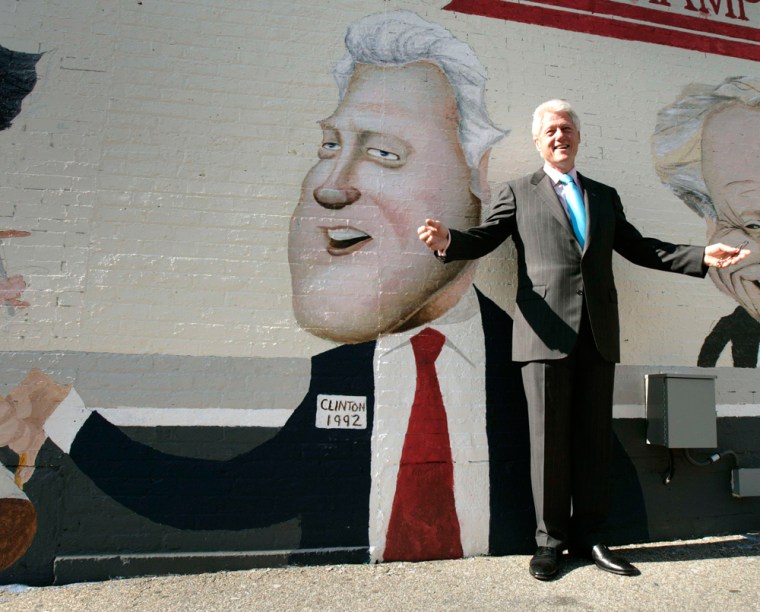Love him or hate him, anybody who’s followed Bill Clinton’s career knows it’s always been about him — as in No. 1 or “me,” “my” and “I.”
Now it’s about her.
Considered by friends to be as self-absorbed as he is brilliant, the former president checks his ego at the curb this week to fly to Iowa and take a surrogate’s role in the presidential campaign of his wife, Sen. Hillary Rodham Clinton of New York.
Her advisers privately fret that the former president will overshadow Sen. Clinton with his unparalleled campaign skills and career-long habit of drawing attention to himself. One of her confidants, still stinging from the Monica Lewinsky affair, refers to Clinton as “Mr. Me.”
But the senator needs his help and her staff is betting that Bill Clinton is ready to be Mr. Her.
“He’s going to talk about her and she’s going to talk about the country,” campaign spokesman Howard Wolfson said. “And nobody can do better than him.”
Wolfson pointed to a powerful, five-minute campaign video in which the former president outlines Sen. Clinton’s biography. Framed by a lamp’s soft yellow glow, Clinton talks about his wife’s commitment to public service, starting in law school, where they met, and continuing throughout their years in Arkansas.
“She just kept plugging away with new ideas, making progress, day in and day out,” Clinton says. “That’s the kind of leader she is.”
The video is a taste of things to come in Iowa, New Hampshire and beyond, campaign officials say.
'I wanna talk about me'
Still, a few discerning Clinton associates note that he used the words “I,” “me” and “my” 16 times in the video. They wryly observe that the taping was a model of self-control when compared with his past habits.
One friend, who refused to be identified because the couple frowns on anything close to criticism, said Clinton’s rhetorical style brings to mind the hit country song by Toby Keith, “I Wanna Talk Talk About Me.” The chorus goes like this:
“I wanna talk about me.”
“Wanna talk about I.”
“Wanna talk about No. 1, oh-my-me-my,
“What I think, what I like, what I know, what I want, what I see ... .”
This friend, and several other associates, said Clinton truly wants to promote his wife’s candidacy and is getting better at it every day. They note that former presidents — much like former chief executive officers — find it difficult to stop talking about their accomplishments and the people who benefited from their leadership.
“Remember how good he was at describing what his presidency was about?” said former White House press secretary Mike McCurry. “And yet, he wasn’t an ‘I’ person. It was more about what we’ve done — what we can do as a country.”
Clinton’s job now is to evolve from the singular “I” and collective “we” to the servile “she.”
“He’s like a great batter adjusting to pitching,” said former Clinton aide Chris Lehane. “He needs to adjust so she comes out the star.”
Dropping the I-bomb
As a campaign surrogate, Clinton bats better than average. He draws huge crowds, enjoys a high approval rating among Democrats and can lay it on thick for those he endorses.
But there’s always an “I” hook.
In 2005, New Jersey Democrat Jon Corzine was so pleased with Clinton’s appearance on his behalf that he turned it into a campaign ad.
“If you ever need a governor who’s strong and smart and good and experienced and full of new ideas and capable of implementing them, you need that person now,” Clinton said, before dropping the I-bomb five times in his next three sentences:
“And I’m here to tell you I did that job for 12 years. I served with 150 other governors. I don’t know of a better qualified person I ever saw present himself or herself for the office of governor than Jon Corzine.”
Always a concern
In 2004, seven weeks after quadruple bypass heart surgery, Clinton campaigned for Democratic presidential nominee John Kerry. The Kerry camp, like Al Gore’s team in 2000, was deeply divided over whether the former president’s appeal to hard-core Democrats outweighed his tendency to turn off swing voters.
Kerry’s aides had another concern: Clinton’s habit of hogging the spotlight. One of them, a consultant who had worked with Clinton, was given the unwelcome assignment of urging the former president to avoid overshadowing Kerry.
The advice didn’t take.
In a 1,400-word speech, Clinton talked about his heart, his record and his presidency as much as he did about Kerry’s campaign. He even gave a nod to Kerry’s rival, President Bush, by telling the crowd, “You’ve got a clear choice between two strong men ... .”
Pleased with his performance, Clinton walked off stage, winked at McCurry and said something to the effect of, “I toned it down a little.”
Not enough for some. At Kerry’s headquarters, a few old Clinton hands who had just joined the campaign were thrilled. A few others, those who had been with Kerry for months, were dispirited — even angry.
They could be heard muttering to each other about Clinton: Why is it always about him?
